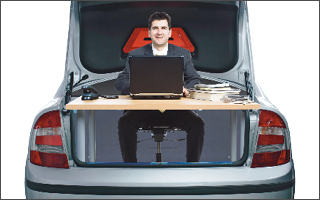Advances in technology have enabled many REALTORS® to ditch the traditional office in favor of working at home or on the go.
By Daniel Rome Levine
When she first started in the real estate business back in 1993, Hope Downey, a CRS in Mobile, Alabama, would go into her office every day in order to make calls and use a desktop computer, copier or fax machine.
Now, she spends less than two hours a week in the office, typically to turn in paperwork, check on files or to attend a meeting or class. Thanks to advances in technology, she doesnt have to be there every day. The office doesnt even have landline phones. A receptionist there routes incoming calls directly to agents cell phones.
Now, because of technology, my office is wherever I happen to be, says Downey, an associate broker with Better Homes & Gardens Generations. It has completely changed the way we do business and where we do it. In our day-to-day jobs, theres really no reason for us to go into an office.
For real estate agents, technology has turned the concept of a traditional office on its head. Working on a laptop or tablet in a coffee shop or at home makes more sense than getting in a car and commuting to a brick-and-mortar office.
Telecommuting, a work arrangement in which an employee works from home or some other location several days a week, is a fast-growing trend. Between 2005 and 2012, the number of telecommuters increased nearly 80 percent to 3.3 million people, or 2.6 percent of the U.S. employee workforce, according to an analysis of Census Bureau data by consulting and research firm Global Workplace Analytics.
Collaborative Workspaces
For the last six years, Tracy Brower, director of Performance Environments and Living Office Placemaking for global office furniture maker Herman Miller, and author of the book Bring Work to Life, has been studying how office space is utilized.
She compares the idea of workers coming in to a traditional brick-and-mortar office every day to an infamous relic of history. For some companies it was like the Berlin Wall: build it, shut employees in and control their movement, she says. Now, technology has freed workers to work just about anywhere, causing organizations to reevaluate the role of their physical workplace.
Brower sees offices transforming from places where people sit at individual desks in relative isolation to places where they gather and collaborate more informally. This means setting up office floor plans that foster casual interaction and feature lounge seating, stools and tall tables, or even coffee bars that make it easy for workers to stop and chat and compare notes on the go.
Renting Office Space
Penny Boyles, CRS, owner of Properties in Carolina in Winston-Salem, North Carolina, knows all about being on the go and the impracticality of going into an office every day. She works a seven-county rural area around Winston-Salem and spends most of her time in her car staying connected to clients and colleagues through technology. When she meets clients, she does so in their homes, or, if they are coming in from out of town and looking in the rural areas, in hotel lobbies, restaurants or coffee shops.
Boyles and the four other agents on her team work from their home offices and stay in touch by email, text messaging and phone. Everything we do as real estate agents is online, from our MLS to all our forms, says Boyles.
But that doesnt mean Boyles is ready to cut ties with office space altogether. When she started her own company in November 2013, after 20 years working mostly for traditional brokerages, she decided to rent 140 square feet of office space in Winston-Salem so she would have a place to hold training sessions and biweekly meetings with her team and to meet with those clients who preferred the formality of an office environment. We cant let technology take over completely, says Boyles. Im still a people person who needs that one-on-one interaction with others. I think its important to have our own space where we can get together and meet face to face.
Boyles says the office space also comes in handy for those clients who are still a little old school and think youve got to meet in an office, she says. Having a prominent Winston-Salem office address also increases our credibility that we are a real real estate firm. We tell clients we can spend our money marketing their properties instead of paying high overhead for class-A office space.
Renting a small office on her own certainly makes economic sense. Boyles is paying less than a third for her space, which includes Wi-Fi and utilities, than she did for her monthly fee when she worked for a large, national franchise firm and was also working from home.
What a huge difference, says Boyles. Its just a no-brainer for us.
Read more about remote virtual assistants.








